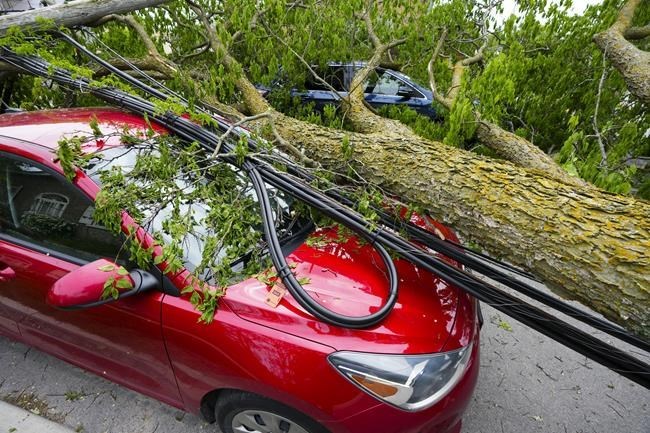Keri Lewis has a double insurance maze to navigate.
Both her home and her workplace in Ottawa were hit hard by Saturday's storm, which ripped through parts of Ontario and Quebec, uprooting trees, cutting power to nearly 900,000 homes and leaving at least 10 people dead.
"It was nuts. It just like came so fast," Lewis, 43, said in a phone interview Tuesday.
"It was like a freight train going hundreds of kilometres an hour past our house ... and there was no visibility, it was just like a sheet of something."
Two "huge, mature" trees fell from her neighbour's yard onto her home, she said. The property in Ottawa's Blossom Park neighbourhood also sustained water damage after hundreds of tiles were torn from the roof by wind and the two trees, which continue to lean against the house.
Meanwhile, at Interval House of Ottawa, a women's shelter where Lewis serves as executive director, a tree tumbled onto the roof while nearly a dozen others toppled around the property and "smashed" its fences, she said.
"I know how stressful it is trying to navigate insurance and getting the roofers to come in... My partner spent about nine hours waiting on hold on various calls," she added. "It's just on such a large scale in this neighbourhood.
"I'm like quite concerned about folks living in our area who may not have access to a vehicle because there are very few or no options to go get food," she said, noting that food in thousands of powerless freezers and fridges is now inedible.
Insurance claims are expected to rise following the deadly storm that swept across Central Canada last weekend, with those affected waiting hours on hold and worrying about basics ranging from income to food security.
Roughly 281,000 residents of Ontario and Quebec — including Lewis and her family — were without power as of Tuesday morning, with two Ontario communities under a state of emergency.
The devastation is too recent to project insurance claim tallies, but home, auto and business insurance will play a key roll in the recovery, said Anne Marie Thomas, director of consumer and industry relations with the Insurance Bureau of Canada.
"The one that we're hearing the most is, 'tree fell on my car, tree damaged my fence, tree damaged my roof, and what about the food in my fridge?'" she said.
Living expenses such as hotels are also covered under most plans should families need to temporarily decamp from damaged properties — power outage alone is not grounds for living expense coverage, said Ratehub's director of insurance Matt Hands. Neither is the cost of tree removal. A crumpled fence that's shared with a neighbour would see each policy cover 50 per cent.
Those with lighter damage should think twice before filing a claim, he said. "Is it worth paying the $1,000 deductible plus the potential increased cost of your home insurance?" — typically 10 per cent to 15 per cent for three years.
Most home and auto insurance plans cover wind- or storm-induced damage. Those looking for compensation should reach out to their own insurer first, regardless of whether it was a neighbour's tree or a Hydro One pole that came crashing down, insurers say.
That process can be more aggravating than it sounds, particularly after a destructive weather event.
Scott Winfield, whose horse-riding academy Brookson Farm faced tornado-force winds in eastern Ontario's Carlsbad Springs, said the co-owner — his wife Nancy Tremblay Winfield — hung up after nearly four hours on hold with their insurer Sunday.
His broker submitted a "rough template of a claim" when Winfield emailed him that day.
Winfield said the farm's indoor riding arena collapsed, leaving a flattened mound of debris. The roof of a barn was torn off, while the farmhouse where Winfield's parents live lost shingles, two chimneys and a deck. A hydro pole punctured the roof and lodged itself in the attic, and a recreational vehicle flipped upside down.
"My major cause for concern right now is establishing what insurance will and will not cover, and how expeditiously they will do so," he said in a phone interview from amid the wreckage.
Rebuild time is another worry, with supply-chain bottlenecks and construction backlogs potential barriers.
"This is our livelihood. It's revenue-generating. Right now we can't offer lessons, we can't have horses inside," said Winfield, 38.
He spoke with several contractors Tuesday morning. "Some people are saying September start time, possibly, if you sign on a contract today, but I can't do anything without insurance at this point "
Winfield hopes business interruption insurance will help fill the cash flow void, while replacement cost insurance pays for restoring items to their original condition or buying new ones of similar value.
Extreme weather continues to highlight the cost of climate change to insurers and taxpayers, Thomas said.
Severe weather caused $2.1 billion in insured damage last year, stemming in part from November flooding in British Columbia and summer hailstorms in Calgary, according to the Insurance Bureau of Canada, which represents private home, auto and business insurers.
2021 now ranks as the sixth highest for insured losses in the past four decades, with five of the six years occurring since 2013. The third highest was 1998, when an ice storm battered parts of eastern Ontario, southern Quebec and Atlantic Canada.
This report by The Canadian Press was first published May 24, 2022.
Christopher Reynolds, The Canadian Press




